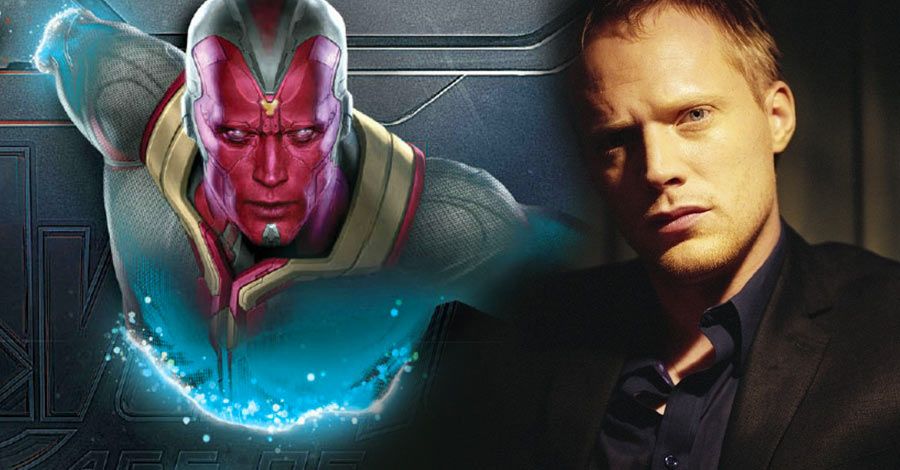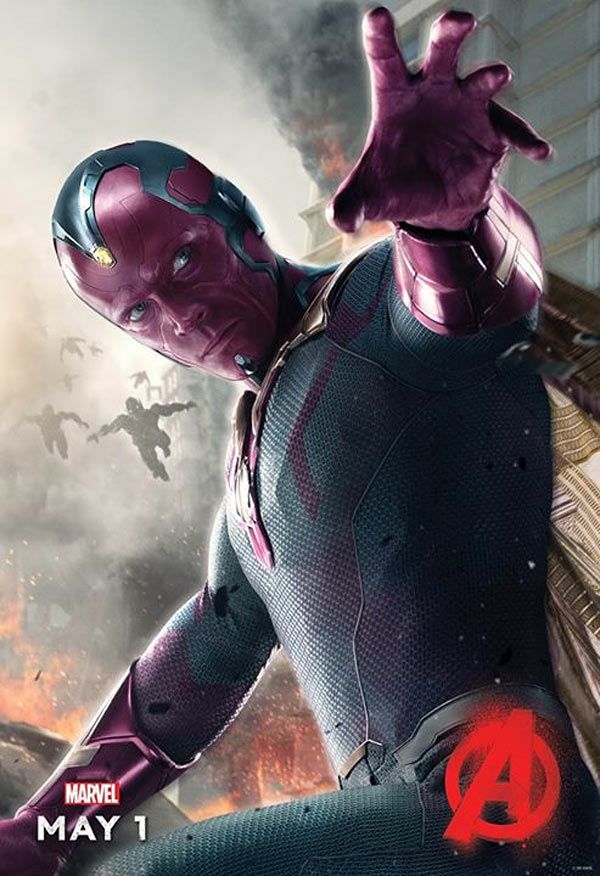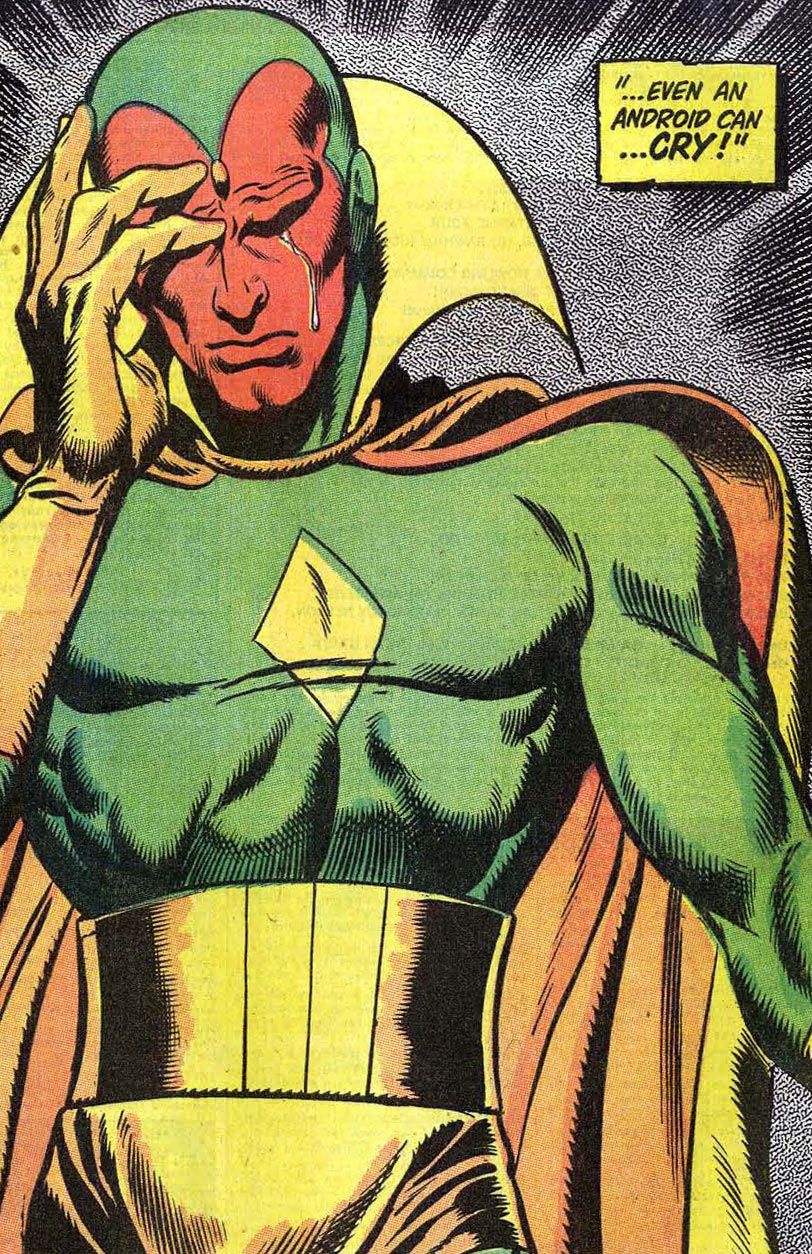SPOILER WARNING: The following interview discusses plot points and story elements from "Avengers: Age of Ultron," in theaters now. You can read CBR's review here.
"Avengers: Age of Ultron" may be Paul Bettany's fifth Marvel Studios film, but his is still a new face for many fans of the Marvel Cinematic Universe.
Bettany's tour of duty in the MCU actually began with the studios' very first film, the original "Iron Man," in which he provided the usually droll, frequently concerned voice of J.A.R.V.I.S., the computer operating system behind all of Tony Stark's interactive tech -- including those suits of armor. And while he certainly brought his acting talent to bear on the role, making the role a fan favorite through three "Iron Man" films and one "Avengers" movie, he admits it wasn't entirely demanding. No hair, no makeup, no wardrobe, no Robert Downey, Jr. necessary to banter with -- Bettany didn't even need to shower as long as he'd show up at the requisite recording booth and put his spin on his lines.
RELATED: Mark Ruffalo Says Hulk Is Great As An Avenger - But Don't Rule Out a Solo Film
But when writer/director Joss Whedon recruited the actor for his first-ever on-screen stint in the MCU for "Age of Ultron," the role of The Vision -- the unique android Avenger who shares an intriguing history with J.A.R.V.I.S. -- came with a much higher degree of difficulty than the automated major domo. In order to achieve the superhero's signature multicolored look, one day's worth of makeup, prosthetics and costuming alone was likely equal to the time he put into his four previous Marvel films.
And, as Bettany revealed to CBR News in a one-on-one chat, there was the trick of acting through all those accoutrements, and resisting the increasing urge to tear off his new green-and-magenta-faced look.
CBR News: So, this was a little more labor-intensive than your previous work with Marvel.
Paul Bettany: Yeah, it was a lot more challenging.
What was the intrigue, the challenge of the Vision for you?
Well, it's unlikely at 43 to be playing somebody being born, and I got to be born. I really was intrigued by that. That was fun in the character. It was fun to explore the idea that you're this super-powerful, omnipotent being, and yet you've just been born, you're entirely naïve, and you have no preconceptions, no sort of inherited moral compass from anybody. What are you going to do? What is your purpose in the world? And what are the dangers of you? It was great fun to play with.
I assume you did some research into the comic books.
Yes, I did. But also, you have this document, which is the script, and you then have Joss Whedon, Jeremy Latcham and Kevin Feige. Kevin was on set a lot. Jeremy Latcham was on set all the time, and you have Joss Whedon, and they are the professors of this universe. So you have questions or worries, and they have an encyclopedic knowledge of that stuff.
RELATED: Vision's "Birth Scene" Revealed In New "Avengers: Age Of Ultron" Clip
Was there something that you saw in the comics, or something Joss or one of the guys behind the scenes said that gave you a key to how you wanted to play the Vision?
Well, of course, when you first Google the Vision, one of the first images is an image of him crying -- [the story] "Even an Android Can Cry," with a tear coming down his cheek. And I thought, "God, that's really interesting, this A.I. having emotions." And I think Joss really wanted to play with the idea of what it is to be human. Obviously, James Spader's character, Ultron, and Vision are sort of flip sides of the same coin, in that they're both born without any preconceptions about what is morally the right thing to do. One guy goes one way, and one guy goes another. I don't know about whether there was anything really specific. Interestingly enough, it's often confines that help you as an actor. Not, "What would my character do?" but, "What would my character not do?"
Then, there's the confines of a really challenging costume and make up -- challenging in the fact that you really have to get to a zen place not to want to rip it off your face. You have a prosthetic piece that is glued -- you've got many prosthetic pieces -- but it's glued down under your eyebrows, all glued to your neck, all around here, right up. And then there's this much of your face free. You can't hear properly. Even when we drilled holes, you can't hear so well. It's quite isolating, and you really need to focus, meditate on the line of actors that would love to be in your place, to stay calm. Find a source of getting yourself to a place where you can remain in a suit that has a portion of it made so you can pump ice-cold water around to keep you cool. There's a lot of sitting and a lot of reading and just trying to remain calm. I think that, weirdly, one of the things that felt like an invasion or encumbrance actually really added to the character that I loved, which was a sense of peace and stillness and stuff. You find it in weird places, right?
Did you try to create a specific distinction between J.A.R.V.I.S. and the Vision?
It happened entirely natural. They feel very different to me. I didn't try to do anything different with my voice, but J.A.R.V.I.S. has an upgrade [Laughs], you know, and is suddenly released into a physical world where he can either be a force of good or evil. Benevolent or dangerous. That gives him a lot more status than J.A.R.V.I.S., who is a servant. He's no longer a servant, and that's very different.
Knowing there's a long tradition of romance between the Vision and Scarlet Witch, did you try to seed any of that for future story possibilities?
I think it's seeded in there, yeah. I think Joss has put some -- there are some moments, I think, where she looks inside his brain, and she's watching him. And for anybody who knows -- for people who don't know, it may wash over them. But for people who are in the know, you're going to sense it.
Did this role give you any extra cred with your kids?
Oh, yeah! I mean, yeah! But just being in the Marvel world had anyways. It's the only thing I've ever done as an actor that they were genuinely interested in.
What was it like, to be fully integrated into the cast?
It's totally great. It was a peculiarly un-daunting experience, actually, I suppose because I had been involved, so there's a history there. I showed up on set, and everybody was incredibly welcoming. Downey said a few words. I said my biggest speech of the movie on my first day, and everybody was very sympathetic about the costume and makeup position that I was in -- except for Downey, who just laughed and thought it was so funny, having been stealing all my money at the end of the show. Every time, he would peek his head into my makeup trailer and go, [Snorting laugh]!
The Vision has always been one of the most definitive Avengers. What are your hopes for his future?
There are so many ways that it could go. It's such a rich character. He changes in so many different ways. There's so much option for the filmmakers going forward with what they want to do with the character.
What I want to do with the character, I really -- I'm an actor that works from a document, and the interim document is the script. Once the script shows up, we can discuss what's in it. In that way, I'm very much a servant rather than -- I've just made my own film as a writer/director, and that's a very different experience. You are the person deciding what these characters are going to do. That's really not my job in this -- my job is really much more to be curious and excited, and I really am. I think there's so many interesting ways for the character to go, and I can't wait to see what they come up with for me.
Looking back, what was your favorite day on set, and your hardest?
Well, the hardest day on set was always if I'd done like three or four days in a row. I once did five days in a row, and because of the length of the makeup, you're off from breaking your turnaround at home -- the amount of time that you're allowed at home before having to come back to the set, that is. Usually, I think, SAG standard is twelve hours, and it was getting broken because there was no way to make the days, the makeup takes so long. So the hardest day was after four days, and waking up in the morning, that time, you wake up, and it's been like, I just put my head on the -- I just laid down, and now my alarm's going. And I'm up, and I got to go back and get in the fucking makeup and suit. Allowing people to do that and really encase you in, like I say, takes a lot of calm, and you have to meditate on the money and how lucky you are to be earning that sort of money. And you have to meditate on the thousands of people that would kill to be in your place and just stay calm. That was hard.
There were so many great days on set. I really loved my first day we had. It was a beautifully written speech by Joss, but my favorite day, I think, was my last scene with James Spader, because it's a father-and-son scene in a sort of complicated, fucked-up way, and you're standing there with an actor who you really admire -- and he's got this crazy fractal suit on and a head rig with cameras that come off like insect antenna with cameras on him and headlights. And you're fucking purple. And yet, all of it falls away, and you're just left with each others' eyes and some sort of older truth. And that was really -- I loved it.




